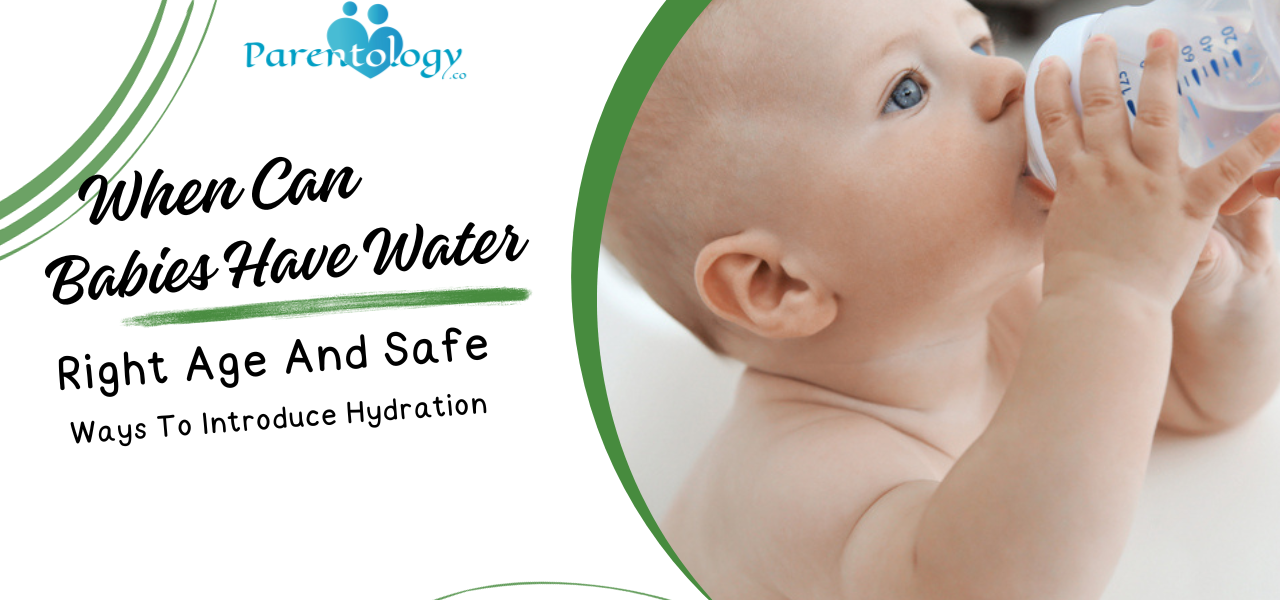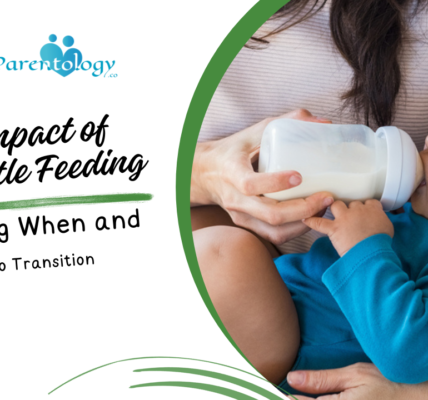When Can Babies Have Water? The Right Age And Safe Ways To Introduce Hydration
Welcoming a newborn brings immense joy and responsibility. One aspect that often sparks curiosity is when babies can start drinking water. Providing babies with the right hydration at the appropriate time is crucial for their development. Understanding the right age and methods for introducing water is essential for every parent. Let’s delve into this important aspect of infant care.
When Can Babies Drink Water?
Babies rely on breast milk or formula for their hydration needs during the initial months of life. The general consensus among healthcare providers is that babies don’t need water before they are six months old. Exclusive breastfeeding or formula feeding fulfills their hydration requirements adequately.
However, after the six-month mark, as you introduce solid foods to your baby’s diet, the need for additional hydration arises. At this stage, you can gradually offer small sips of water. It’s crucial to ensure that the water provided is clean and preferably boiled to maintain purity.
Why Can’t Babies Drink Water Early?
Babies’ tiny kidneys aren’t developed enough to process excess water efficiently. Giving water too early can disrupt the electrolyte balance in their bodies, leading to water intoxication, a potentially dangerous condition. This is why adhering to the recommended timeline for introducing water is crucial.


Safely Introducing Water to Babies:
- Gradual Introduction: Start by offering small sips of water from a clean, sterilized cup.
- Purity Matters: Boil water and let it cool before giving it to your baby to ensure it’s free from contaminants.
- Monitor Hydration: Observe cues from your baby – if they seem thirsty or dehydrated, offer a small amount of water.
- Avoid Sweetened Beverages: Stay away from sugary drinks or juices as they aren’t suitable for infants.
Hydration and Baby Development:
Hydration plays a pivotal role in a baby’s growth and overall health. Adequate hydration supports their developing organs, aids digestion, and maintains body temperature. However, excessive water intake, especially before the recommended age, can dilute essential nutrients, impacting their growth.
Indications of Baby Thirst:
Recognizing signs of thirst in babies is crucial. While they primarily receive hydration from breast milk or formula, there are cues indicating they might need additional water:
- Increased Irritability: Babies might get fussy or irritable when they are thirsty.
- Dry Lips and Mouth: Dryness around the lips or mouth could indicate a need for hydration.
- Decreased Urination: If your baby has reduced wet diapers, it might signify a need for extra fluids.


However, always consult a healthcare professional to confirm if these signs indicate a need for water supplementation.
Hydration and Weather Conditions:
In hotter climates or during sweltering weather, babies might require more fluids to stay adequately hydrated. It’s essential to monitor their hydration levels during these conditions, offering small amounts of water if needed, while still adhering to the recommended guidelines.
Water and Solid Food Introduction:
As your baby progresses to eating solid foods, they’ll naturally need additional fluids. At this stage, you can introduce water in small quantities alongside their meals. It’s pivotal to maintain a balance, as excessive water intake might reduce their appetite for nutrient-rich foods.
Hydration and Health Benefits for Babies:
Ensuring adequate hydration for your baby extends beyond quenching their thirst. Proper hydration fosters numerous health benefits:
- Digestive Health: Sufficient water intake aids in softening stools, potentially preventing constipation issues commonly encountered in infants transitioning to solid foods.
- Temperature Regulation: Babies are more susceptible to overheating. Ample hydration assists in regulating their body temperature, especially during warmer weather.
- Kidney Function: Balanced hydration supports kidney health by maintaining fluid balance and aiding in waste removal.
- Cognitive Development: While hydration directly impacts physical health, studies suggest that proper hydration positively influences brain function, potentially benefiting cognitive development.
Hydration Beyond Water:
Apart from water, breast milk or formula remains the primary source of hydration for infants. Additionally, as babies start consuming solid foods, they receive hydration from fruits, vegetables, and other foods with high water content, further supporting their overall hydration needs.
Introducing Water in a Baby’s Diet:
As a parent, ensuring a smooth transition to water intake involves patience and observation. Some babies might take to drinking water eagerly, while others might need time to adapt. Experimenting with offering water at different temperatures or using colorful cups may encourage them to accept it more readily.


Factors Influencing Hydration Needs:
- Activity Levels: Babies who are more active might need slightly more water than less active ones.
- Illness or Fever: During bouts of illness or fever, babies might need increased hydration to prevent dehydration.
- Breastfeeding and Water Intake: Breastfed babies might need less water intake as breast milk adapts to meet their hydration needs, especially in the initial months.
Hydration and Sleep:
Maintaining proper hydration could positively impact a baby’s sleep patterns. Babies who are well-hydrated may sleep more soundly, contributing to their overall health and wellbeing.
Expert Advice and Consultation:
It’s crucial to discuss any concerns or questions regarding your baby’s hydration needs with a healthcare professional. They can offer personalized guidance, taking into account your baby’s unique developmental stage and health history.
Hydration and Feeding Practices:
Introducing water to babies involves strategic timing, especially during meal times. Here are some tips for incorporating water into your baby’s feeding routine:
- Between Meals: Offering small sips of water between meals, rather than during or immediately after, helps prevent interference with nutrient absorption from breast milk or formula.
- During Solid Food Introduction: Alongside introducing solids, gradually introduce water in small quantities to accompany meals, encouraging good hydration habits as part of their routine.
- Avoid Overfeeding with Water: While it’s crucial to provide adequate hydration, overfeeding water might cause your baby to feel full, impacting their appetite for nutritious foods.


Hygiene and Water Safety:
Maintaining cleanliness and ensuring water safety is imperative when introducing water to babies:
- Sterilization: Use sterilized cups or sippy cups specifically designed for infants to avoid contamination.
- Boiling Water: Boiling tap water and letting it cool before offering it to your baby minimizes the risk of potential contaminants.
- Storage: Store boiled water in clean, covered containers to maintain its purity.
- Bottled Water Caution: If opting for bottled water, ensure it’s labeled as suitable for infants and free from additives.
Babies with Special Hydration Needs:
Certain conditions or situations might warrant adjustments in hydration practices:
- Preterm Babies: Premature babies might have different hydration needs. Consult with a healthcare professional for guidance tailored to their specific requirements.
- Illness or Diarrhea: Babies experiencing illness or diarrhea might require increased hydration to prevent dehydration. Rehydration solutions, as recommended by healthcare providers, can help replenish lost fluids and electrolytes.
- Allergies or Intolerances: Babies with allergies or intolerances might have specific considerations regarding hydration sources. Seek advice from a pediatrician to ensure safe hydration practices.
Transitioning from Bottles to Cups:
As babies grow, transitioning from bottle feeding to using cups becomes essential. Gradually introducing water in a cup instead of a bottle encourages independent drinking skills and supports proper oral development.
Monitoring Hydration Habits:
As your baby grows, maintaining a healthy hydration routine becomes integral. Encourage drinking water by offering it consistently and providing positive reinforcement when they take sips from their cup.
Frequently Encountered Myths:
- Myth: Babies need water in hot weather, regardless of age.
- Fact: While babies might need extra hydration in hotter climates, it’s crucial to introduce water at the appropriate age as per healthcare recommendations.
- Myth: Fruit juices are as good as water for babies.
- Fact: Fruit juices, especially for infants, can be high in sugars and lack the necessary hydration without the added nutritional benefits.
- Myth: All bottled water is suitable for babies.
- Fact: It’s recommended to boil tap water to ensure its purity. Not all bottled water is suitable for infant consumption.
Advisory for Parents:
Always consult your pediatrician or a healthcare professional before introducing water to your baby’s diet. Every baby’s developmental stage is unique, and personalized guidance ensures their safety and wellbeing.
FAQs on Introducing Water to Babies:
-
Can I give water to my newborn?
- No, newborns don’t require water as breast milk or formula provides adequate hydration.
-
At what age can I start giving water to my baby?
- Wait until your baby is around six months old and starting solid foods.
-
How much water should I give to my baby?
- Offer small sips of water, usually around 2-4 ounces a day, depending on their age and needs.
-
Are there any signs that my baby needs water?
- Watch for signs like increased thirst, darker urine, or dry lips, indicating potential dehydration.
-
Can I use bottled water for my baby?
- Preferably, boil tap water and let it cool to ensure purity. Bottled water can be an alternative if it’s specifically labeled for infants.
-
Is it safe to give my baby fruit juice instead of water?
- No, it’s advisable to stick to plain water and avoid introducing juices until later in their infancy.
-
What are the risks of giving water too early to babies?
- Early introduction of water can lead to electrolyte imbalances, disrupting the delicate balance in your baby’s system.
-
How should I offer water to my baby?
- Use a sterilized cup or a sippy cup in small amounts to start with.
-
Can babies drink water in hot weather?
- Yes, in hot climates, babies might need a little extra water to stay hydrated, but monitor it carefully and don’t overdo it.
-
When can I let my baby drink water independently?
- As your baby grows and develops better motor skills, around the age of one, they can start drinking water from a small cup independently.
Conclusion:
Understanding the right time to introduce water to your baby is crucial for their health and development. By adhering to the recommended guidelines, ensuring purity, and monitoring their cues, parents can ensure a safe and healthy transition to water consumption in their baby’s diet.
Remember, every baby is unique, so consulting your pediatrician for personalized guidance is always recommended.
For further expert advice and insights on parenting topics, visit Parentology.co for a wealth of information and guidance.





